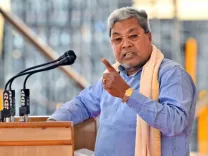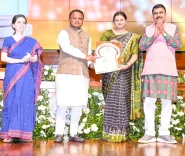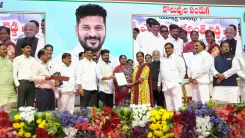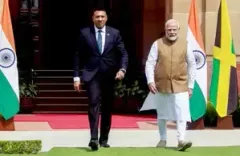Is NCERT Distorting History by Claiming Parts of Rajasthan Were Under Maratha Rule?

Synopsis
Key Takeaways
- Controversy over NCERT textbook
- Claims of Maratha rule disputed
- Protests led by royal families and BJP
- Call for accuracy in historical representation
- Need for review of educational content
Jaipur, Aug 5 (NationPress) A new controversy has surfaced in Rajasthan concerning a Class 8 social science textbook published by the National Council of Educational Research and Training (NCERT). The textbook depicts significant areas of the state, including Jaisalmer, Mewar, and Bundi, as part of the Maratha Empire.
This portrayal has sparked strong backlash from former royal families and leaders of the Bharatiya Janata Party (BJP), who argue that it represents a significant distortion of historical facts.
The disputed map illustrates the Maratha Empire expanding from Kolhapur to Cuttack and up to Peshawar, encompassing regions of Punjab and extensive parts of Rajasthan, including Jaisalmer, Mewar, and Bundi.
Critics claim that there is no historical documentation to substantiate the assertion of Maratha dominance, taxation, or governance over these princely states.
Leading the protest is Vishwaraj Singh Mewar, a BJP MLA and member of the Mewar royal family, alongside his wife Mahima Kumari, BJP MP from Rajsamand.
"Initially misrepresented as being under British control, now depicted as under Marathas — who will educate the educators at NCERT? Are they truly capable of presenting India's factual history?" questioned Mahima and Vishwaraj.
They are supported by Chaitanyaraj Singh Bhati of the former Jaisalmer royal family, Brigadier (Retired) Bhupesh Singh Hada from the Bundi royal family, and Bhanwar Jitendra Singh of the Alwar royal family.
In a pointed remark, Chaitanyaraj Singh Bhati stated, "Such unverified and unfounded information not only undermines the credibility of organizations like NCERT but also harms our rich heritage and public sentiment. It seems to be a deliberate effort to distort history and tarnish the legacy of our ancestors. No reliable historical source indicates Maratha rule, invasion, or taxation in Jaisalmer.
Brigadier (Retired) Bhupesh Singh Hada echoed similar sentiments in a social media post dated July 28, asserting: "We were never under Maratha control. Don't damage our dignity with fabricated tales."
Bhanwar Jitendra Singh underscored that history should be based on verified information rather than influenced by regional or political agendas.
"In the 18th century, Rajasthan's princely states, including Marwar, Mewar, Bikaner, Jaipur, Bharatpur, Jaisalmer, and Alwar, retained their independence and autonomy. Historical records show that Maratha activities in Rajasthan were limited to raids, not governance. To claim otherwise is to distort the truth and undervalue the valor and sovereignty of our ancestors."
Experts contend that such historical inaccuracies are not simply academic mistakes but raise serious concerns regarding the intentional misrepresentation of Indian history in school curricula.
They are calling for immediate corrections, urging NCERT to maintain the accuracy and integrity of India's historical narrative.
As the debate escalates, historians and educators are being encouraged to reassess textbook contents, ensuring that regional pride, historical accuracy, and national integrity are upheld within academic discussions.









